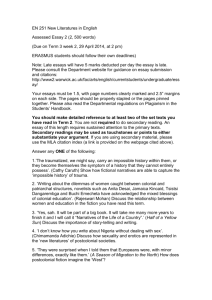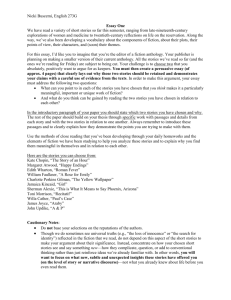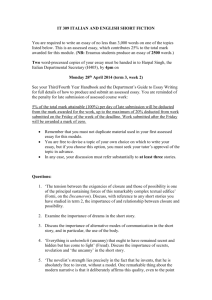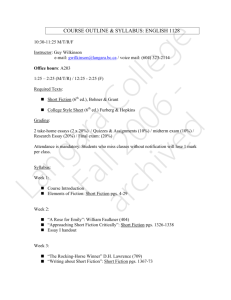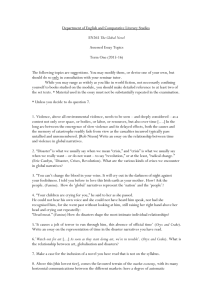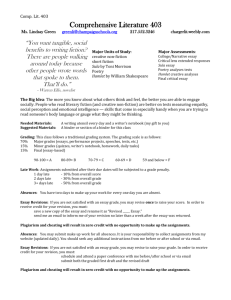EN 251 New Literatures in English Second Assessed Essay
advertisement
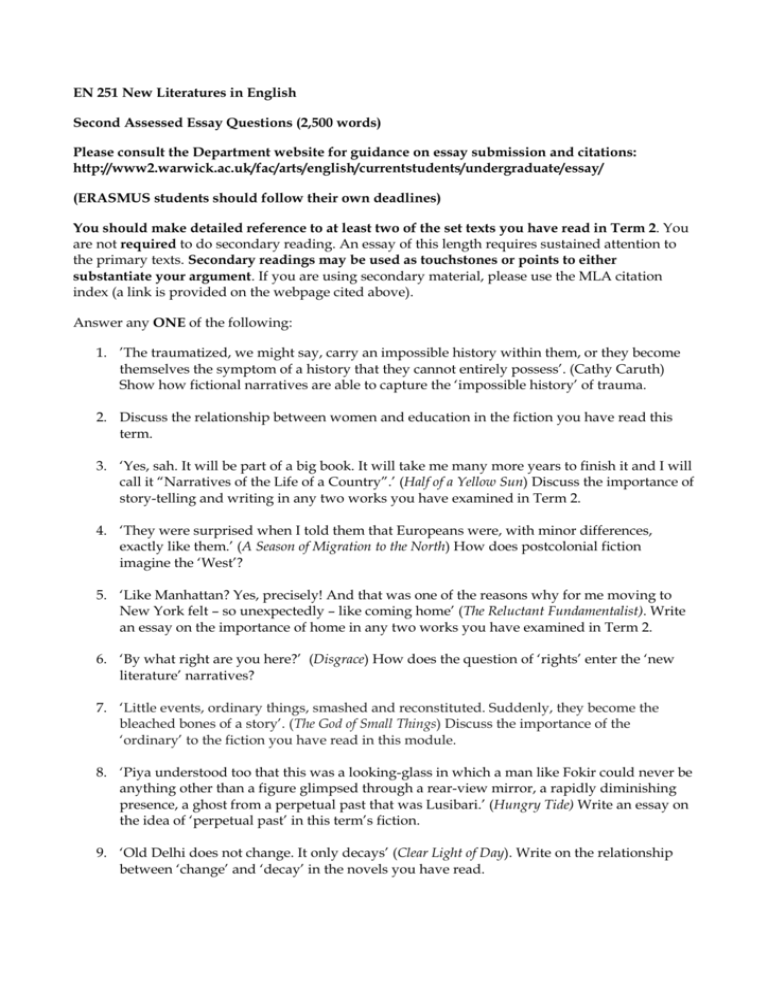
EN 251 New Literatures in English Second Assessed Essay Questions (2,500 words) Please consult the Department website for guidance on essay submission and citations: http://www2.warwick.ac.uk/fac/arts/english/currentstudents/undergraduate/essay/ (ERASMUS students should follow their own deadlines) You should make detailed reference to at least two of the set texts you have read in Term 2. You are not required to do secondary reading. An essay of this length requires sustained attention to the primary texts. Secondary readings may be used as touchstones or points to either substantiate your argument. If you are using secondary material, please use the MLA citation index (a link is provided on the webpage cited above). Answer any ONE of the following: 1. ’The traumatized, we might say, carry an impossible history within them, or they become themselves the symptom of a history that they cannot entirely possess’. (Cathy Caruth) Show how fictional narratives are able to capture the ‘impossible history’ of trauma. 2. Discuss the relationship between women and education in the fiction you have read this term. 3. ‘Yes, sah. It will be part of a big book. It will take me many more years to finish it and I will call it “Narratives of the Life of a Country”.’ (Half of a Yellow Sun) Discuss the importance of story-telling and writing in any two works you have examined in Term 2. 4. ‘They were surprised when I told them that Europeans were, with minor differences, exactly like them.’ (A Season of Migration to the North) How does postcolonial fiction imagine the ‘West’? 5. ‘Like Manhattan? Yes, precisely! And that was one of the reasons why for me moving to New York felt – so unexpectedly – like coming home’ (The Reluctant Fundamentalist). Write an essay on the importance of home in any two works you have examined in Term 2. 6. ‘By what right are you here?’ (Disgrace) How does the question of ‘rights’ enter the ‘new literature’ narratives? 7. ‘Little events, ordinary things, smashed and reconstituted. Suddenly, they become the bleached bones of a story’. (The God of Small Things) Discuss the importance of the ‘ordinary’ to the fiction you have read in this module. 8. ‘Piya understood too that this was a looking-glass in which a man like Fokir could never be anything other than a figure glimpsed through a rear-view mirror, a rapidly diminishing presence, a ghost from a perpetual past that was Lusibari.’ (Hungry Tide) Write an essay on the idea of ‘perpetual past’ in this term’s fiction. 9. ‘Old Delhi does not change. It only decays’ (Clear Light of Day). Write on the relationship between ‘change’ and ‘decay’ in the novels you have read. 10. ‘Yet the current crop of vengeance killings is not only insistently moralistic, at least in Avatar and District 9 but also is directed not at the standard lawbreakers of Western or police drama, but at white men in positions of power and authority [….] Thus the revenge climax alludes to the fundamental social issue of the distribution of the right to violence, in each case seizing it from the “evil” representatives of the fictional status quo and wielding it against them in the name of justice.’ (John Reider). Can there ever be a ‘right to violence’? Discuss by referring to District 9 and at least one other text from your module. 11. Discuss the significance of the family home in Anita Desai’s Clear Light of Day and Arundhati Roy’s The God of Small Things. You may want to focus on one of these two topics: inheritance and gender relations; history and memory. 12. ‘At this moment, lying in wait, I can think only of the Poet’s words: “beauty is nothing but the start of terror we can hardly bear and we adore it because of the serene scorn it could kill us with…” All night long, I have been asking myself, what is it I am afraid of? Now, with the rising of the sun, I have understood what it is: I am afraid because I know that after the storm passes, the events that have preceded its coming will be forgotten. No one knows better than I how skilful the tide country is in silting over its past. There is nothing I can do to stop what lies ahead. But I was once a writer; perhaps I can make sure at least that what happened here leaves some trace, some hold upon the memory of the world. The thought of this, along with the fear that preceded it, has made it possible for me to do what I have not been able to for the last thirty years – to put my pen to paper again’ (The Hungry Tide). These are Nirmal’s words, written in his journal. To what extent can we take what Nirmal says about his own writerly role as the bearer of witness as the blueprint for what the authors you have read this term attempt to do in their fiction?
